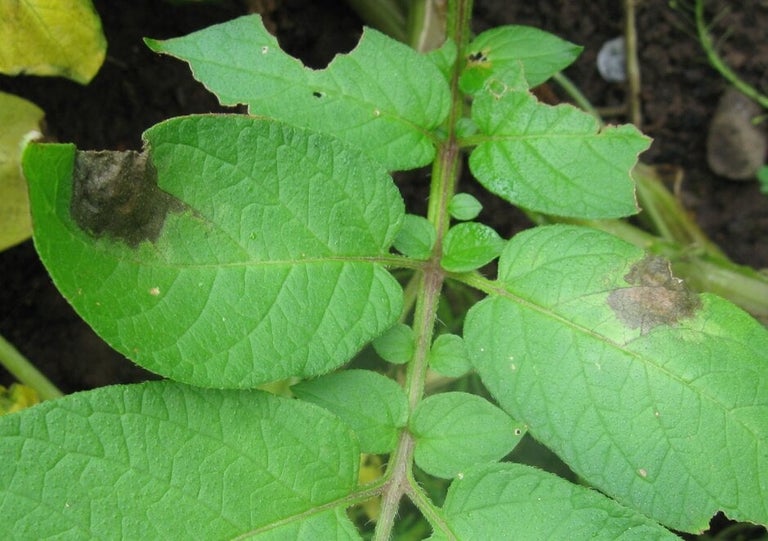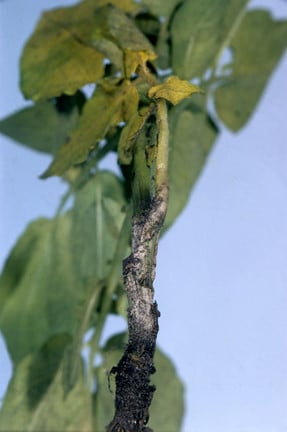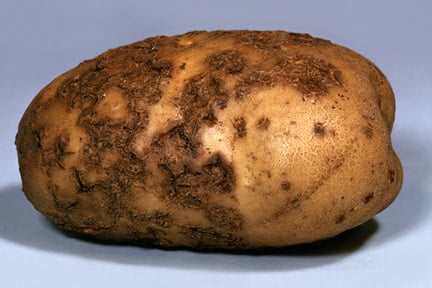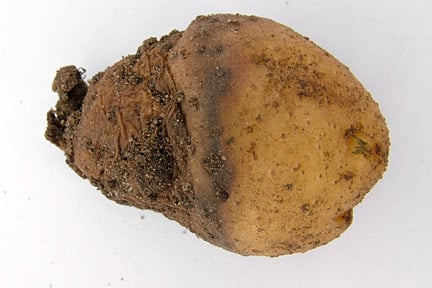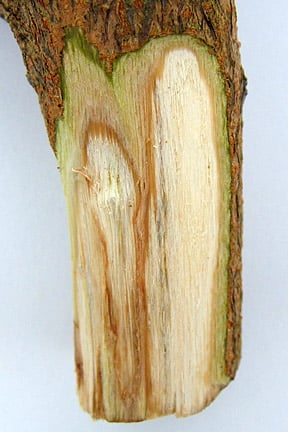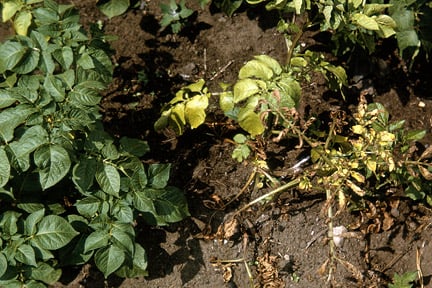
Quick facts
Common name - Potato blackleg
Scientific name - Pectobacterium atrosepticum
Plants affected - Potatoes
Main symptoms - Yellowing stems, stunted growth and black rot at stem bases
Caused by - Bacteria
Timing - June onwards
What is potato blackleg?
Blackleg is a disease of potatoes caused predominantly by the bacterium Pectobacterium atrosepticum. Occasionally other Pectobacterium species, or species of another bacterium called Dickeya, have also been found associated with blackleg in the UK. It is one of the earliest potato diseases to appear, you may see symptoms as early as June, especially in wet years.
This disease only infects potatoes.
Symptoms
You may see the following symptoms:
- As early as June, the stems of potato plants appear stunted and pale green or yellow, with yellow leaves
- Leaves at the top of affected stems may be small, stiff and have margins curled inwards
- At ground level, these affected stems appear black and rotted
- If tubers form, the flesh may be grey or brown and rotten, with the soft decay often progressing into the from the stolon

Control
Non-chemical control
There is a number of control measures that do not require chemicals:
- The most important control measure is prompt removal and destruction of infected plants as soon as symptoms are noticed and before the disease has time to spread
- Commercially produced seed usually has very low (but not zero) levels of infection. Gardeners who save their own seed should try and ensure that levels of the bacteria are low. Dry storage of seed or ware (grown for consumption) potatoes will minimise the risk of spread in storage
- The disease thrives in warm, damp conditions so improve poorly drained sites
- Try to lift crops during dry weather
- Rotation is important, since the bacteria may survive over winter in ground where potatoes were previously grown, albeit at a low level. Rotation also reduces the risk of infection arising from infected volunteer potatoes (potato plants that grow from tubers inadvertently left in the ground from the previous year's crop)
- Choose resistant cultivars. AHDB Potatoes produces the British Potato Variety Database, which lists resistant cultivars including ‘Charlotte’, ‘Pixie’, ‘Saxon’ and ‘Vales Sovereign’. Visit The British Potato Variety Database for more information
Chemical control
There are no chemical controls available to gardeners for blackleg.
Biology
In the UK, blackleg is almost always caused by the bacterium Pectobacterium atrosepticum (previously known as Erwinia carotovora pv. atroseptica). It is one of the few important plant diseases caused by bacteria in the UK.
This disease normally comes into gardens (or allotments) via infected seed potatoes. Infected plants are removed from commercial seed crops, but a small number of infected tubers escape detection and seed lots will usually contain a few of these. These infections in the seed tubers are usually symptomless and impossible for gardeners to detect.
If the infected plants that grow from these are not removed from the crop promptly, the disease will spread through the soil to infect new plants. The bacteria survive over winter principally in infected volunteer tubers and potato plant debris. They also survive at low levels in the root zone of some weeds. The bacteria may also be carried through the crop by insects or on contaminated soil.
However, in gardens it is infected seed potatoes that are the most important source. If affected plants are not removed they may form some tubers, but a large proportion of these will be infected via the stolons, and they will rot (usually from the end to which the stolon was attached) in the soil or during storage.

